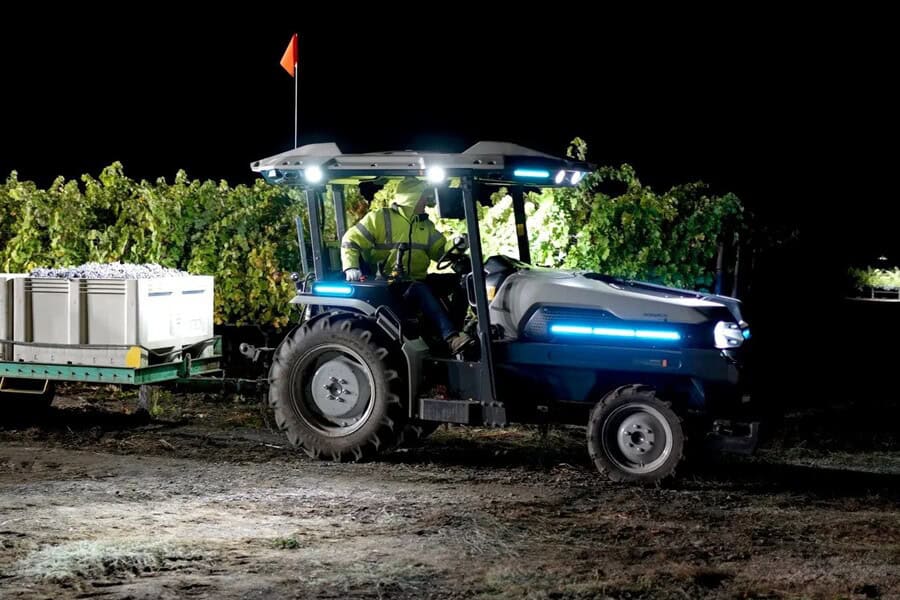Monarch Tractor, an autonomous electric tractor startup headquartered in Livermore, California, has announced layoffs impacting around 10% of its workforce. The restructuring aims to pivot the company towards non-agricultural markets, expand its software sales, and focus on licensing its advanced autonomous vehicle (AV) technology. This marks the second round of job cuts for Monarch Tractor in 2023, following a 15% workforce reduction in July. Approximately 35 employees were laid off in this latest round, and reports indicate that some were let go without receiving severance packages.
Challenges Triggering the Restructuring
The decision to implement these layoffs follows a challenging third quarter, despite Monarch securing $133 million in fresh funding earlier this year. Major investors included Foxconn, a leading electronics manufacturer, and Astanor, an agri-food tech impact firm. CEO Praveen Penmetsa acknowledged that despite the capital injection, the company faced unexpected difficulties, including a downturn in California’s vineyard industry. Vineyards had previously been a key customer base for Monarch’s electric tractors, but declining demand in this sector, coupled with a broader pullback in agri-tech investments, prompted the need for a strategic shift.
“The industry has slowed down on acquiring new equipment and solutions, especially in the core farming sectors,” Penmetsa explained. “However, as a platform company, we are now seeing exciting opportunities outside of agriculture that have emerged because of our success in agri-tech.”
Expanding Beyond Agriculture
To adapt to the shifting market landscape, Monarch Tractor is broadening its focus beyond traditional agricultural clients. The company has delivered 500 units to date but now plans to target new segments, including golf courses, solar farms, and municipal services. These industries present lucrative opportunities for Monarch’s autonomous technology, which has proven effective in managing diverse and complex tasks.
Penmetsa emphasized that the company’s expertise in agricultural applications has opened the door to non-agricultural markets that are eager to adopt advanced automation. “We’ve built a solid foundation in agriculture, and now we’re ready to leverage that expertise in new areas,” Penmetsa said. “Expanding into sectors like solar farms and golf course maintenance allows us to diversify our customer base and revenue streams.”
The company is also ramping up its efforts to promote its “WingspanAI” software, an AI-powered farm management tool. WingspanAI has demonstrated promising results in optimizing farm operations, and Monarch sees significant potential in marketing this software to both agricultural and non-agricultural clients. By enhancing its software offerings, Monarch aims to create a steady, scalable revenue stream that complements its hardware business.
Shifting Focus to Licensing Autonomous Technology
One of the most significant changes in Monarch’s new strategy is its plan to license its autonomous vehicle technology to other manufacturers. Talks are already underway with several off-road vehicle companies interested in integrating Monarch’s AV tech into their own products. This shift reflects a broader transformation in Monarch’s business model, positioning the company more as a technology provider rather than purely a tractor manufacturer.
“Licensing our autonomous technology allows us to tap into a wider market and generate recurring revenue,” Penmetsa explained. “We’re seeing strong interest from companies across various industries that want to adopt our cutting-edge AV solutions.”
This approach allows Monarch to capitalize on its proprietary technology while minimizing the costs and risks associated with manufacturing. It also provides an opportunity to establish partnerships and expand its technological footprint across diverse industries.
Evolving Partnership with Foxconn
Monarch’s relationship with Foxconn, the contract manufacturer that assembles its tractors at the Lordstown, Ohio facility, is also evolving as part of the restructuring. The company plans to lean more heavily on Foxconn for operational support, allowing Monarch to streamline its internal processes and focus more on software development and licensing initiatives.
By outsourcing a larger portion of its production tasks to Foxconn, Monarch can allocate more resources toward innovation and expanding its software and technology offerings. “Foxconn’s expertise in manufacturing provides us with the flexibility we need to scale efficiently,” Penmetsa noted. “This partnership allows us to be agile and responsive to changing market demands.”
Adapting to a Changing Market
Penmetsa emphasized the need for agility in today’s volatile market environment, particularly for startups like Monarch that face fluctuating demand and evolving industry dynamics. He acknowledged the rapid pace of change in the agricultural tech sector, underscoring the importance of adapting quickly to new opportunities and challenges.
“We are a startup, and agility is key to our survival and growth,” Penmetsa said. “The industry has changed significantly, and we need to pivot swiftly to stay ahead.”
As Monarch Tractor pivots towards new revenue streams and expands its customer base, the success of its restructuring efforts remains to be seen. The company’s transition signals a strategic shift aimed at leveraging its autonomous technology across a broader array of industries, moving beyond its agricultural roots to secure a stronger, more diversified market position.
With the focus now on software, technology licensing, and new market expansion, Monarch’s restructuring could mark the beginning of a new chapter for the startup. Whether this strategy will yield long-term success depends on its ability to capitalize on emerging opportunities and navigate the complex landscape of autonomous technology and industrial automation.


